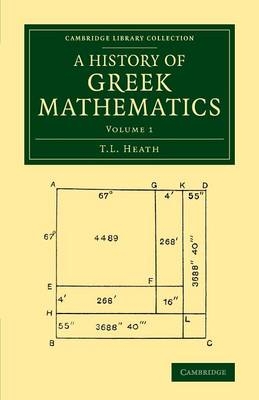
A History of Greek Mathematics: Volume 1
Seiten
2013
Cambridge University Press (Verlag)
978-1-108-06306-7 (ISBN)
Cambridge University Press (Verlag)
978-1-108-06306-7 (ISBN)
Published in 1921 and aimed at mathematicians and classicists, this rigorous two-volume work traces ancient Greek mathematics from Thales of Miletus to the achievements of the Alexandrian algebraists. Volume 1 includes an introduction and a section on numerical notation and arithmetical operations. The coverage begins with Thales and extends to Euclid.
'If one would understand the Greek genius fully, it would be a good plan to begin with their geometry.' As early as the sixth century BCE, Thales of Miletus used geometrical principles to calculate distance and height. Within a few hundred years, Euclid had produced his seminal Elements, which was still used as a textbook when this two-volume work was first published in 1921. A distinguished civil servant as well as an expert on ancient Greek mathematics, Sir Thomas Little Heath (1861–1940) includes here sufficient detail for a modern mathematician to grasp ancient methodology, alongside explanatory sections aimed at classicists. This remains a rigorous and essential exposition of a vast topic. Volume 1 includes an introduction that touches on the conditions which made possible the rapid development of philosophy and science in ancient Greece. The coverage begins with Thales and ends with Euclid.
'If one would understand the Greek genius fully, it would be a good plan to begin with their geometry.' As early as the sixth century BCE, Thales of Miletus used geometrical principles to calculate distance and height. Within a few hundred years, Euclid had produced his seminal Elements, which was still used as a textbook when this two-volume work was first published in 1921. A distinguished civil servant as well as an expert on ancient Greek mathematics, Sir Thomas Little Heath (1861–1940) includes here sufficient detail for a modern mathematician to grasp ancient methodology, alongside explanatory sections aimed at classicists. This remains a rigorous and essential exposition of a vast topic. Volume 1 includes an introduction that touches on the conditions which made possible the rapid development of philosophy and science in ancient Greece. The coverage begins with Thales and ends with Euclid.
Preface; 1. Introductory; 2. Greek numerical notation and arithmetical operations; 3. Pythagorean arithmetic; 4. The earliest Greek geometry; 5. Pythagorean geometry; 6. Progress in the elements down to Plato's time; 7. Special problems; 8. Zeno of Elea; 9. Plato; 10. From Plato to Euclid; 11. Euclid.
| Erscheint lt. Verlag | 21.11.2013 |
|---|---|
| Reihe/Serie | Cambridge Library Collection - Classics |
| Zusatzinfo | Worked examples or Exercises |
| Verlagsort | Cambridge |
| Sprache | englisch |
| Maße | 140 x 216 mm |
| Gewicht | 590 g |
| Themenwelt | Mathematik / Informatik ► Mathematik ► Geschichte der Mathematik |
| ISBN-10 | 1-108-06306-3 / 1108063063 |
| ISBN-13 | 978-1-108-06306-7 / 9781108063067 |
| Zustand | Neuware |
| Informationen gemäß Produktsicherheitsverordnung (GPSR) | |
| Haben Sie eine Frage zum Produkt? |
Mehr entdecken
aus dem Bereich
aus dem Bereich
Das Jahrhundert, in dem die Mathematik sich neu erfand. 1870-1970
Buch | Hardcover (2022)
Heyne (Verlag)
22,00 €
a secret world of intuition and curiosity
Buch | Hardcover (2024)
Yale University Press (Verlag)
32,70 €
a global history of Mathematics & its Unsung Trailblazers
Buch | Softcover (2024)
Penguin Books Ltd (Verlag)
16,20 €


